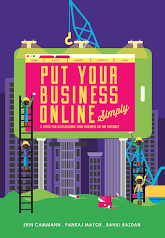Woodcutter Without An Axe: New Twist To An Old Tale “Man is a tool-using animal. Without tools he is nothing, with tools he is all.” - Thomas Carlyle
We’ve all read Aesop’s story, Mercury and
the Woodcutter, sometimes called The Golden Axe. Remember how the woodcutter
sat down and wept near the river bank as his axe – his only means of livelihood
– was lost?
That’s how helpless a man is without his tools.
Henri
Bergson defined man as "the animal that makes things." Bergson
also went on to declare that man’s superiority lies in his power to build and improvise
on himself and his things.
For instance, a beaver doesn’t have anything except his
teeth and lion his claws, but a man has a storehouse of tools at his disposal, no
matter what work or industry he chooses for himself.
But does that mean that he uses these tools all the time?
Are modern marketers a bit like the woodcutters of yore? Or
quite the opposite? Here’s my rant – um, take – on this.
Unmindful of Tools We
Use Daily
Imagine a woodcutter
not aware his axe could cut trees. Wouldn’t he only cut stems and small
branches?
We are surrounded (drowned?) by tools today, from our smart
phones to the apps in our smart phones, from scissors we use at home to software
we use at work – our life is what it is today because someone saw a problem and
tried to fix it by making a tool for it. This is the improvisation that Bergson wrote about in 1907 and holds true even
today.
But more often than not, we forget that we are using a tool
and blame technology for everything that is wrong with our society.

The other day my mom “causally remarked” (in her words) that
I was spending too much time on my phone, laptop and Xbox. (Oh, you thought girlie gamers didn’t exist?)
Coming back to my mom, you know what happened next – I kept
my mouth shut and started writing.
Tools – both software and hardware – have become an
inseparable part of our work and lives, so whether you accept it wholeheartedly
or grudgingly, technology is here to stay.
Basically the point I am trying to make here is that all the
advanced, cloud-based software, infrastructure and platforms that you see
around you are merely tools, only more advanced. Despite that we are quick in our judgment
that it’s
millennials who are
over-dependent on tools.
The new breed of startups use a host of tools to get things
done faster and save costs.
Serial entrepreneurs have mastered the art of zeroing in on
the right tools and making the best use of them. In fact, it has become a
second nature for the resourceful generation of today to use any tool without the
limitations of a major learning curve.
For instance, solo entrepreneurs just starting out with
ecommerce are now creating their own websites using DIY landing page builders
and shopping cart-integrated platforms such as Spaces
– not unlike bloggers with WordPress. The argument in favor is that it is
simple – if it’s easier on the pocket and you can do it yourself, why pay
someone else to do it? If I can create a Facebook, Instagram and Medium
account, I can very well build my own website.
A mindful leader with full
awareness of her business objectives and the potential the technology at hand
can make the best use of any given tool.
Inability to Adapt to
Technology
Can we solve world’s
problems with more axes or more woodworkers, or more skilled woodworkers who
know how to wield the axe?
A lot of people who started work before the internet took
over the workplace are resistant to technology, at times claiming they can’t get
a handle on all these “fancy gadgets and tools.” Surely, my snap-happy grandpa
doesn’t belong to the same group.

Image Source: Funniestmemes.com
According to researchers,
human learning spans over a lifetime so if you really want to master those SQL
queries, you can. I always remind my grandpa that having an alarm clock means
you don’t need to live near a poultry farm in order to wake up to the sound of
roosters crowing.
The fear of becoming too dependent on technology makes
people resistant to change and causes a lot of chaos in their lives – they are
typically seen pushing deadlines with zero work-life balance – but they still
continue resisting automation. Marketers and business owners are no exception.
This is the most common and deleterious way we deprive ourselves of tools. The
sad part is that we are actually quite advanced in our knowledge and aware of
innovations in our field but are still resistant to change.
Unappreciative of
Technology & Tools
What if the
woodworker didn’t care enough about his axe and hadn’t cried at the river bank?
Let’s do a little experiment. Ask a few people around you to
name three tools. I asked my colleagues to do the same. I didn’t specify which
tools or for what purpose. I asked them to simply say whatever came to their
minds first.
70 percent of them named the software tools we use for work
while 30 percent listed hardware such as hammers, screwdrivers and mobile phones.
Almost all of my experiment’s subjects were appreciative of the value or
difference these tools brought to their lives.
If you’re not impressed with the tools that allow you to
call your customers or transfer your money or buy that new skirt, or if you
aren’t fully appreciative of the difference these tools are making to the
workplace, or worse, if you don’t use these tools as much as you can, you can
be sure that no fairy is ever going to bless you with silver and golden riches.
From a coffee machine that
keeps everyone awake at work to the perennially jammed printer, it is
impossible to go on without tools. Walk into a typical web design and
ecommerce solutions company like Ocoos and
you ’ll find the designers using Photoshop, managers using Excel, social media
guys using Buffer, accountants using Wave, the CEO using plain old email (far
better than you or I can)... the list goes on. All this technology, software
and apps are not going to solve world’s problems, but skilled people who know
how to make the best use of these tools, can.
Failure to Improvise on
the Use of Technology
What if the
woodworker was so obsessed with the axe that he didn’t notice other woodcutters
were using chainsaws?
We live in times where technology changes in the blink of an
eye. Let’s look at Henri Bergson’s definition again – man’s man’s superiority
lies in his power to build and improvise on “himself” and his “things.”
The catchphrase here is to
improvise on himself and his things. Case in point would be our transition
from floppy discs to USBs, from letters to IMs, from carts to self-driving cars,
from flea
markets to dash buttons.
Now imagine if we were still commuting on horse-drawn carriages
or sending telegrams! Simply put, our inability to improvise on our tools could
be as disastrous as not using tools at all.
Coda
A report
in The Economist titled “The Third Industrial Revolution” makes a strong claim that
technology breakthroughs will radically change manufacturing. From software to
artificial intelligence, robots to 3D printing, technology is out to change the
world and only those who can adapt and adopt it wholeheartedly will survive and
evolve.
Donagh
Herlihy, Bloomin’ Brands said that no matter what your function, you should
be tech savvy. He emphasized on digging into and understanding how you can use
technology to improve your business area. And believe me, it can.
A lot of people fail to understand how dynamic the modern
workplace has become and resistance to technology can put them to significant
disadvantage. Those who seize the vast opportunities that come with adapting
can enjoy a lot of benefits in business whereas those who don’t face an
insurmountable mountain that becomes difficult to climb with each passing day.
So, never underestimate or under-use your axe. And most importantly,
don’t be wary of the silver and golden axes (upcoming technology) unexpectedly
bestowed upon you – they will come in handy soon!


